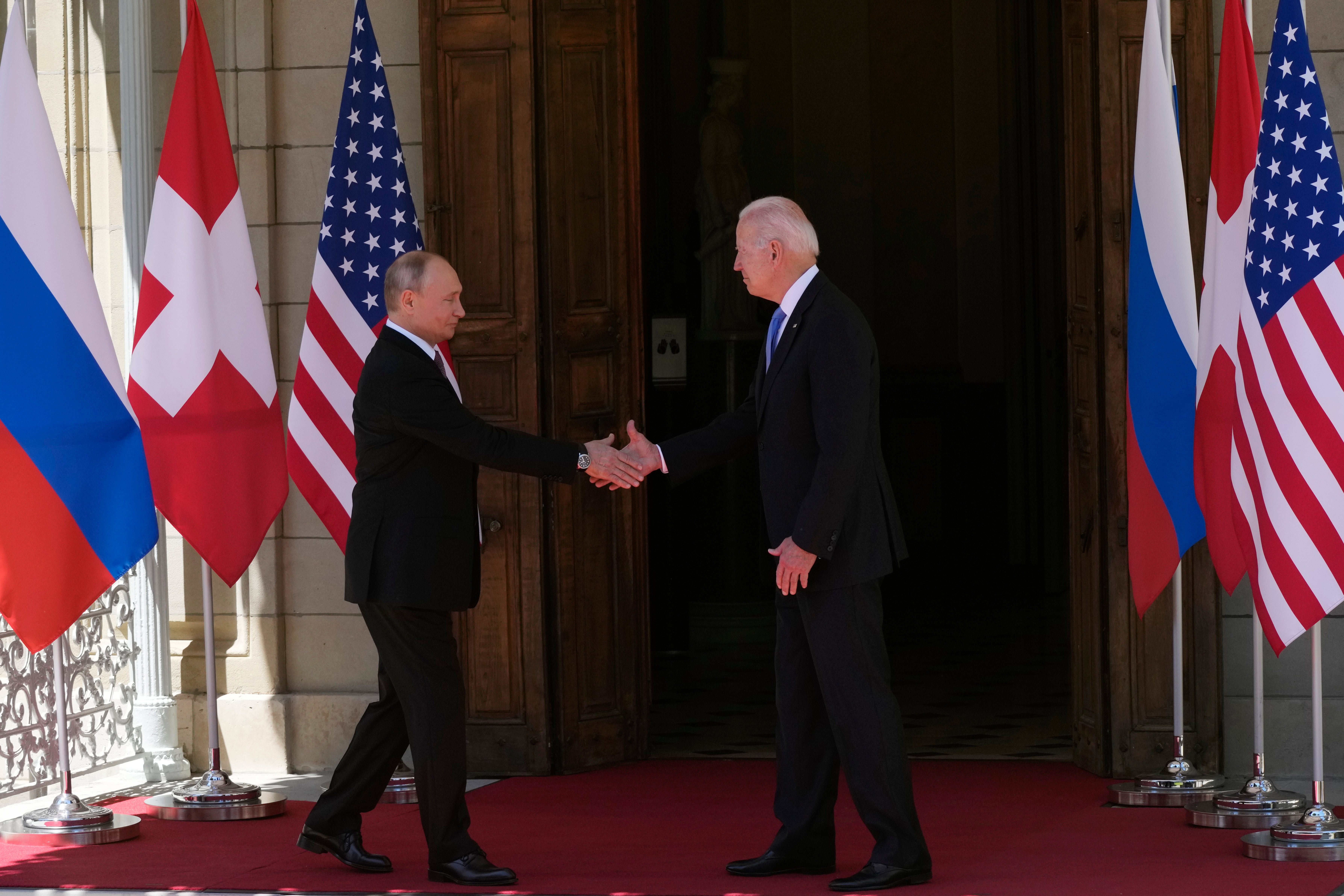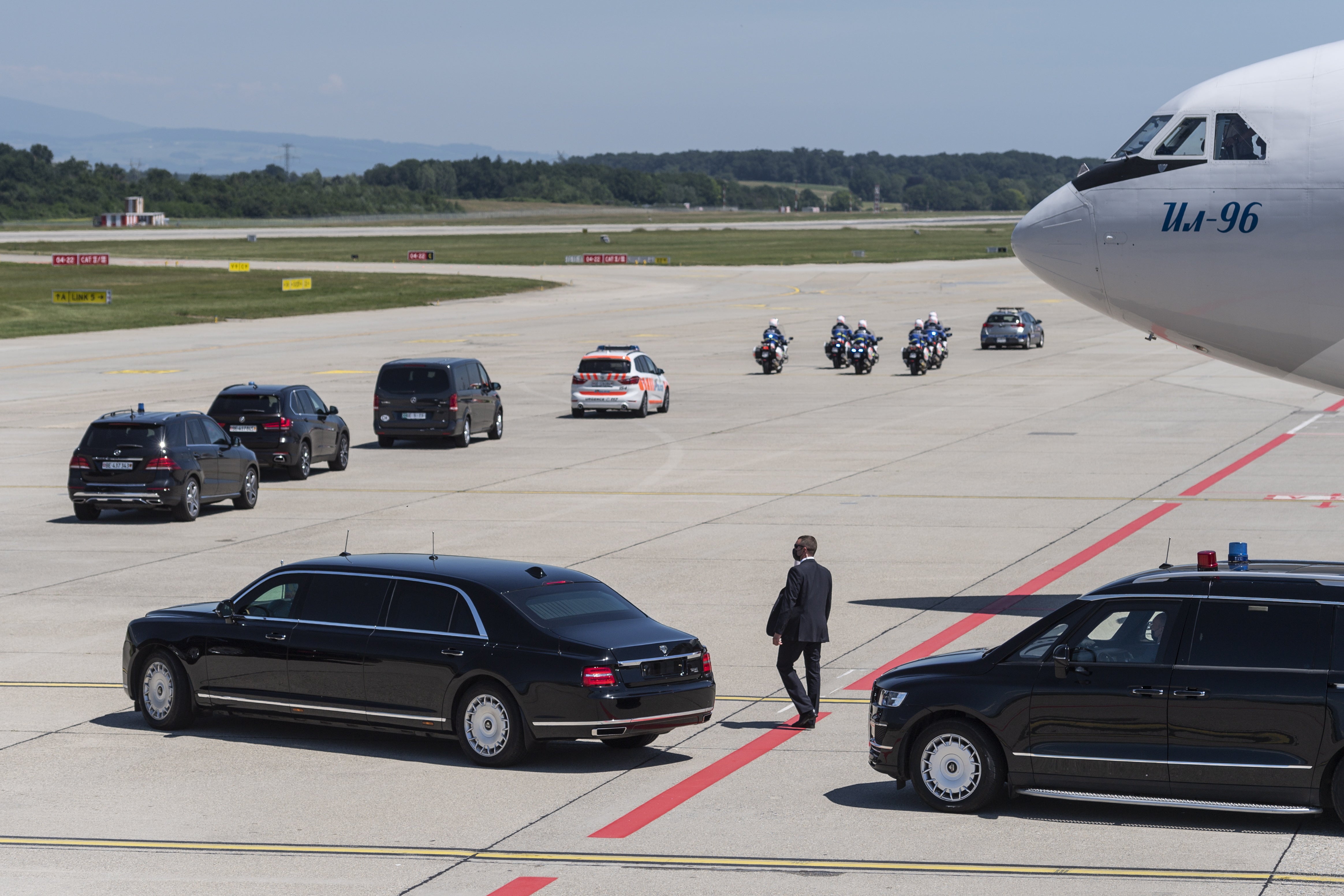Joe Biden and Vladimir Putin talks begin at Geneva Summit
It is the first bilateral meeting between the two leaders since Joe Biden was elected as US leader

US President Joe Biden came face to face with Russian leader Vladimir Putin in Switzerland on Wednesday as talks began between the two superpowers.
The pair smiled and shook hands as they met in Geneva, ahead of what are expected to be tough talks lasting as long as five hours.
Mr Putin said that he hoped the talks would be “productive”. The one-day summit is expected to focus on issues of nuclear arms control, human rights and potential prisoner swaps between the two countries.
Biden called it a discussion between “two great powers” and said it was “always better to meet face to face.”
In a scene that resembled a VIP wedding — but with bomb squads — both leaders arrived for photo opportunities, before heading inside the bucolic 18th century villa that play host to their high-level talks.
Presidents Biden and Putin were met by their Swiss host, president Guy Parmelin, in scheduled order shortly after 1pm local time.
The Kremlin’s chief, known for making his counterparts wait, arrived first, in his new Aurus limousine. Mr Biden emerged from his vehicle approximately ten minutes later, but not before a lengthy wait for his security detail to make last minute checks.
Much of central Geneva was barricaded in advance of the encounter, Joe Biden and Vladimir Putin’s first ever presidential summit.
Barbed wire cut off the beach, park and promenade surrounding the venue. The skies above were put on high alert, watched over by military helicopters and air defence systems.
The Russian side seemed as concerned with biosecurity. At 6am on Wednesday morning, they summoned journalists to the delegation’s hotel in central Geneva for an additional Covid test.
This is Vladimir Putin’s first foreign trip since the beginning of the pandemic — the first time he has mingled close to other mortal souls — and his team appeared to be taking no chances.
Against a backdrop of terrible bilateral relations, both sides have warned not to expect breakthroughs. In the build-up, the watchword for the White House has been "stabilisation”. For the Kremlin, it’s "normalisation." Some have suggested that’s already a contradiction.
All the same, US-Russia summits always create a sense of expectation. A hope that bureaucracies can, however briefly, find notes of agreement — at least when it comes to the thousands of strategic warheads at each others’ disposal.
The choice of Geneva is in itself a symbolic one. It was here, 36 years ago, that Ronald Reagan first met with Mikhail Gorbachev, and began to lay down an infrastructure for nuclear disarmament.
Much of that foundation has already been dismantled, with Donald Trump’s decision to cancel a number of the treaties only accelerating a previous trend for US withdrawal.
With Joe Biden showing greater interest in putting the breaks on a growing arms race, strategic stability is expected to form the spine of talks. Other topics for discussion will include climate change, the Arctic, and regional security issues including the Middle East, Afghanistan, North Korea and Nagorno Karabakh.
A second set of issues promise to be trickier: Ukraine, sanctions, human rights and political prisoners. The United States is expected to raise concerns over the Novichok poisoning and jailing of opposition leader Alexei Navalny — and the Kremlin is expected to ignore them.
Officials have said the talks will progress through three stages. The first stage will incorporate small teams from both sides: presidents, foreign ministers and translators. The second will bring in a wider entourage.

Russia’s wider team will include no fewer than seven top officials, including Chief of the General Staff Valery Gerasimov and its point man on Ukraine, Dmitry Kozak.
There will be no dining together and press conferences will be separate: first Vladimir Putin, then Joe Biden. The Russian leader was apparently happy for a joint press conference. The Americans decided that might not be in their interests. "It’s not a competition," the US president said.
Dmitry Bykov, the writer and Kremlin critic reportedly targeted in a 2019 Novichok assassination attempt, said the Mr Biden had made the correct decision in rejecting a shared platform. He also expressed hope that the United States had understood confrontation wasn’t in anyone’s interests.
"Your arms are tied, and if you try to talk with Russia in an aggressive tongue, you won’t get anywhere," he said. "Try licking Russia with the language of love."
Join our commenting forum
Join thought-provoking conversations, follow other Independent readers and see their replies
Comments
Bookmark popover
Removed from bookmarks